In-depth Analysis: Migration Law, Visa Issues, and Case of Beni
VerifiedAdded on 2023/01/18
|7
|1580
|42
Case Study
AI Summary
This case study delves into Australian migration law, analyzing the Beni v. Minister for Immigration and Border Protection case concerning time extensions for merit reviews. It examines the implications of visa cancellations, focusing on scenarios involving bridging visas and the Administrative Appeals Tribunal (AAT). The study further explores the potential for Federal Court review of AAT decisions, emphasizing jurisdictional errors. Additionally, it addresses the possibility of appealing to the Minister for discretionary intervention in the public interest, outlining the types of bridging visas that may be applicable. The document provides a detailed analysis of relevant sections of the Migration Act 1958 and associated regulations, offering a comprehensive overview of the legal framework governing visa cancellations and appeals in Australia. This assignment is available on Desklib, a platform providing study tools and resources for students.
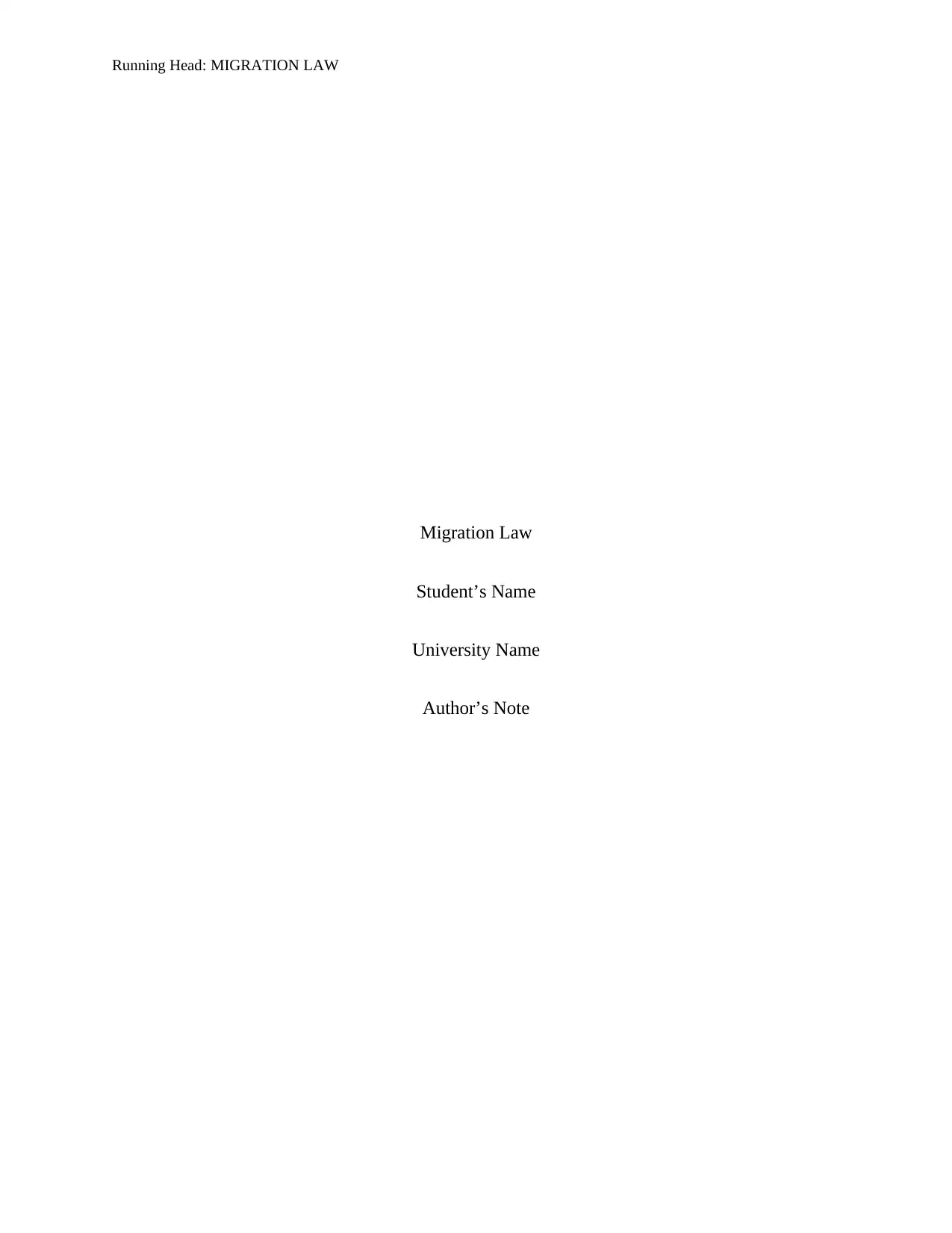
Running Head: MIGRATION LAW
Migration Law
Student’s Name
University Name
Author’s Note
Migration Law
Student’s Name
University Name
Author’s Note
Paraphrase This Document
Need a fresh take? Get an instant paraphrase of this document with our AI Paraphraser
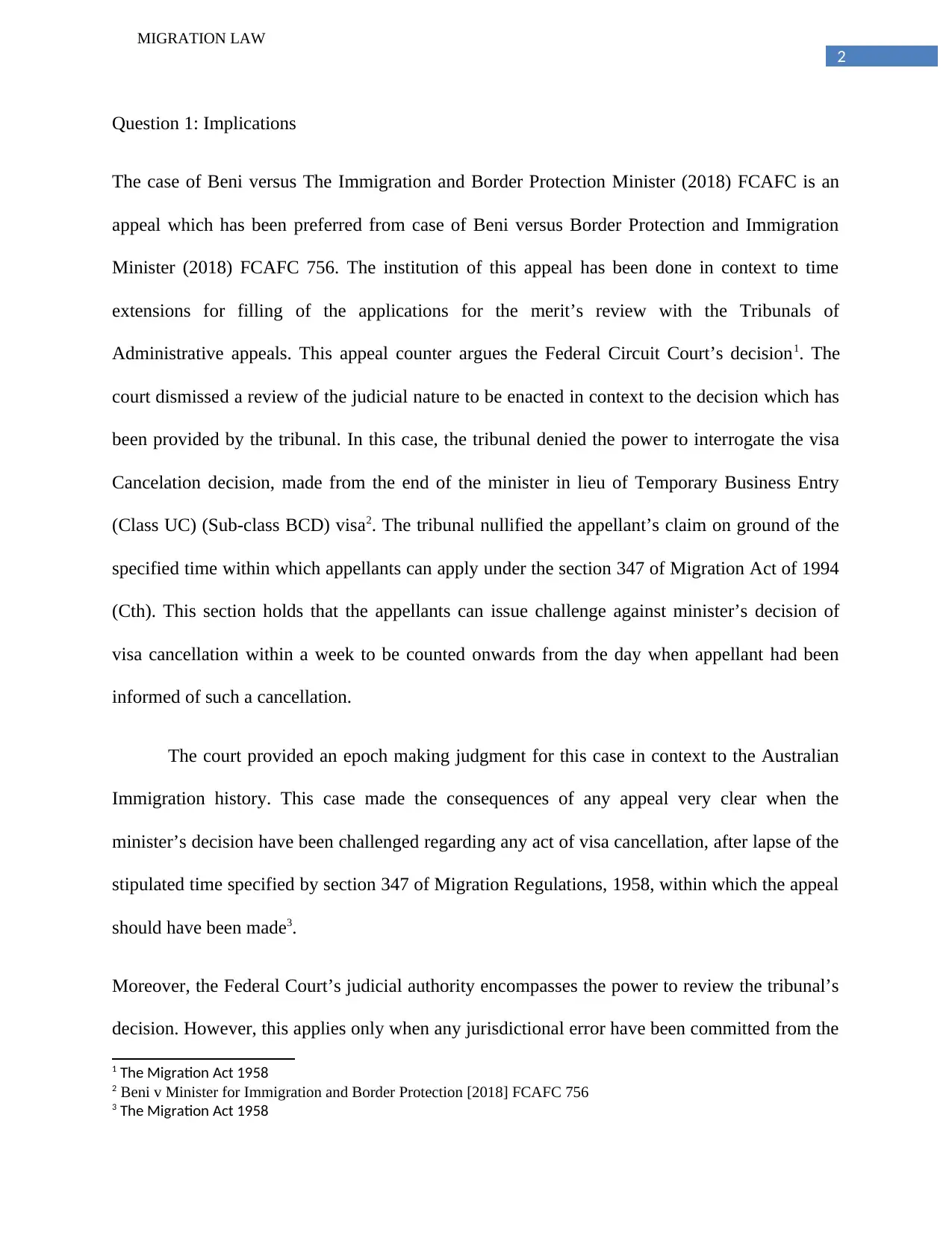
2
MIGRATION LAW
Question 1: Implications
The case of Beni versus The Immigration and Border Protection Minister (2018) FCAFC is an
appeal which has been preferred from case of Beni versus Border Protection and Immigration
Minister (2018) FCAFC 756. The institution of this appeal has been done in context to time
extensions for filling of the applications for the merit’s review with the Tribunals of
Administrative appeals. This appeal counter argues the Federal Circuit Court’s decision1. The
court dismissed a review of the judicial nature to be enacted in context to the decision which has
been provided by the tribunal. In this case, the tribunal denied the power to interrogate the visa
Cancelation decision, made from the end of the minister in lieu of Temporary Business Entry
(Class UC) (Sub-class BCD) visa2. The tribunal nullified the appellant’s claim on ground of the
specified time within which appellants can apply under the section 347 of Migration Act of 1994
(Cth). This section holds that the appellants can issue challenge against minister’s decision of
visa cancellation within a week to be counted onwards from the day when appellant had been
informed of such a cancellation.
The court provided an epoch making judgment for this case in context to the Australian
Immigration history. This case made the consequences of any appeal very clear when the
minister’s decision have been challenged regarding any act of visa cancellation, after lapse of the
stipulated time specified by section 347 of Migration Regulations, 1958, within which the appeal
should have been made3.
Moreover, the Federal Court’s judicial authority encompasses the power to review the tribunal’s
decision. However, this applies only when any jurisdictional error have been committed from the
1 The Migration Act 1958
2 Beni v Minister for Immigration and Border Protection [2018] FCAFC 756
3 The Migration Act 1958
MIGRATION LAW
Question 1: Implications
The case of Beni versus The Immigration and Border Protection Minister (2018) FCAFC is an
appeal which has been preferred from case of Beni versus Border Protection and Immigration
Minister (2018) FCAFC 756. The institution of this appeal has been done in context to time
extensions for filling of the applications for the merit’s review with the Tribunals of
Administrative appeals. This appeal counter argues the Federal Circuit Court’s decision1. The
court dismissed a review of the judicial nature to be enacted in context to the decision which has
been provided by the tribunal. In this case, the tribunal denied the power to interrogate the visa
Cancelation decision, made from the end of the minister in lieu of Temporary Business Entry
(Class UC) (Sub-class BCD) visa2. The tribunal nullified the appellant’s claim on ground of the
specified time within which appellants can apply under the section 347 of Migration Act of 1994
(Cth). This section holds that the appellants can issue challenge against minister’s decision of
visa cancellation within a week to be counted onwards from the day when appellant had been
informed of such a cancellation.
The court provided an epoch making judgment for this case in context to the Australian
Immigration history. This case made the consequences of any appeal very clear when the
minister’s decision have been challenged regarding any act of visa cancellation, after lapse of the
stipulated time specified by section 347 of Migration Regulations, 1958, within which the appeal
should have been made3.
Moreover, the Federal Court’s judicial authority encompasses the power to review the tribunal’s
decision. However, this applies only when any jurisdictional error have been committed from the
1 The Migration Act 1958
2 Beni v Minister for Immigration and Border Protection [2018] FCAFC 756
3 The Migration Act 1958
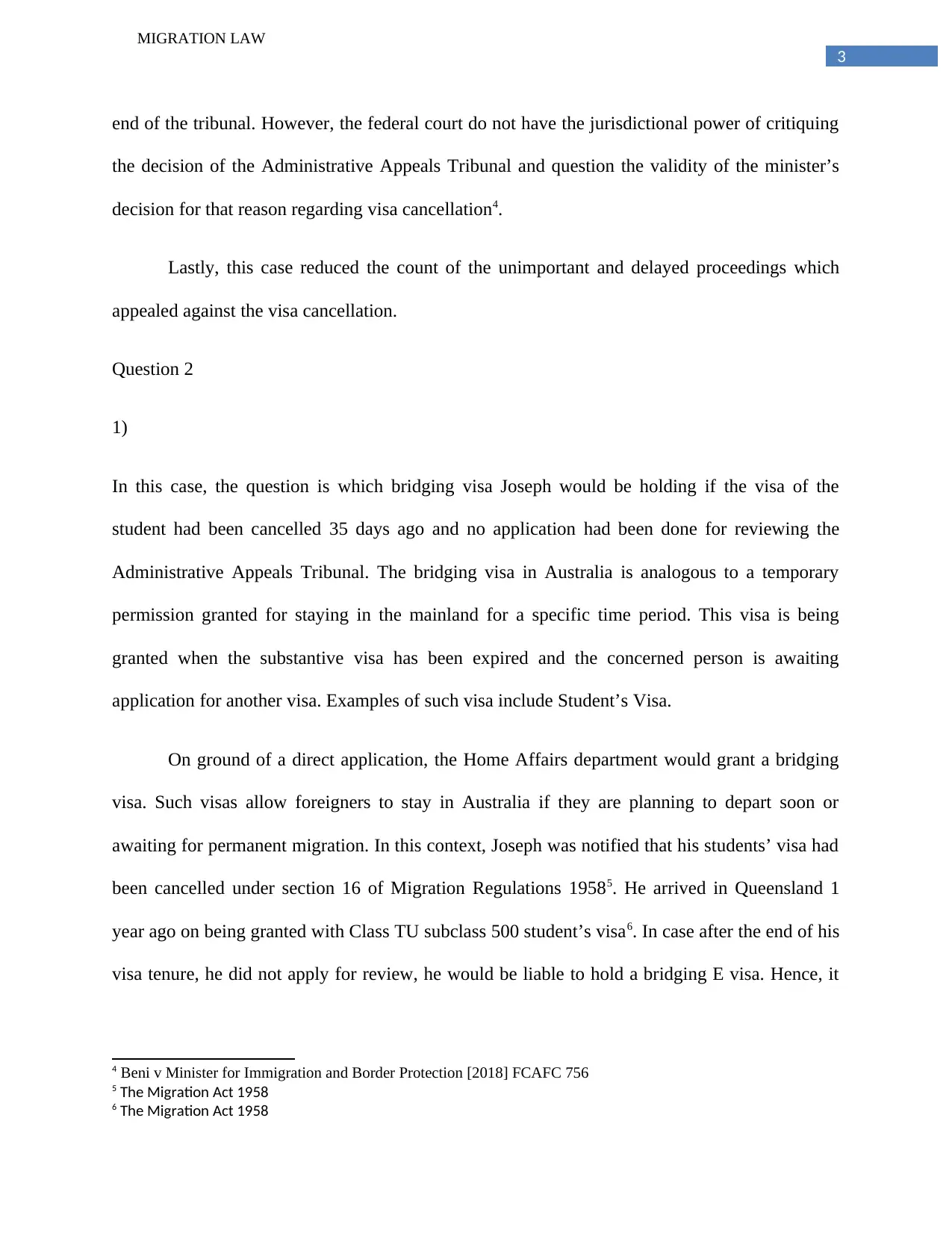
3
MIGRATION LAW
end of the tribunal. However, the federal court do not have the jurisdictional power of critiquing
the decision of the Administrative Appeals Tribunal and question the validity of the minister’s
decision for that reason regarding visa cancellation4.
Lastly, this case reduced the count of the unimportant and delayed proceedings which
appealed against the visa cancellation.
Question 2
1)
In this case, the question is which bridging visa Joseph would be holding if the visa of the
student had been cancelled 35 days ago and no application had been done for reviewing the
Administrative Appeals Tribunal. The bridging visa in Australia is analogous to a temporary
permission granted for staying in the mainland for a specific time period. This visa is being
granted when the substantive visa has been expired and the concerned person is awaiting
application for another visa. Examples of such visa include Student’s Visa.
On ground of a direct application, the Home Affairs department would grant a bridging
visa. Such visas allow foreigners to stay in Australia if they are planning to depart soon or
awaiting for permanent migration. In this context, Joseph was notified that his students’ visa had
been cancelled under section 16 of Migration Regulations 19585. He arrived in Queensland 1
year ago on being granted with Class TU subclass 500 student’s visa6. In case after the end of his
visa tenure, he did not apply for review, he would be liable to hold a bridging E visa. Hence, it
4 Beni v Minister for Immigration and Border Protection [2018] FCAFC 756
5 The Migration Act 1958
6 The Migration Act 1958
MIGRATION LAW
end of the tribunal. However, the federal court do not have the jurisdictional power of critiquing
the decision of the Administrative Appeals Tribunal and question the validity of the minister’s
decision for that reason regarding visa cancellation4.
Lastly, this case reduced the count of the unimportant and delayed proceedings which
appealed against the visa cancellation.
Question 2
1)
In this case, the question is which bridging visa Joseph would be holding if the visa of the
student had been cancelled 35 days ago and no application had been done for reviewing the
Administrative Appeals Tribunal. The bridging visa in Australia is analogous to a temporary
permission granted for staying in the mainland for a specific time period. This visa is being
granted when the substantive visa has been expired and the concerned person is awaiting
application for another visa. Examples of such visa include Student’s Visa.
On ground of a direct application, the Home Affairs department would grant a bridging
visa. Such visas allow foreigners to stay in Australia if they are planning to depart soon or
awaiting for permanent migration. In this context, Joseph was notified that his students’ visa had
been cancelled under section 16 of Migration Regulations 19585. He arrived in Queensland 1
year ago on being granted with Class TU subclass 500 student’s visa6. In case after the end of his
visa tenure, he did not apply for review, he would be liable to hold a bridging E visa. Hence, it
4 Beni v Minister for Immigration and Border Protection [2018] FCAFC 756
5 The Migration Act 1958
6 The Migration Act 1958
⊘ This is a preview!⊘
Do you want full access?
Subscribe today to unlock all pages.

Trusted by 1+ million students worldwide
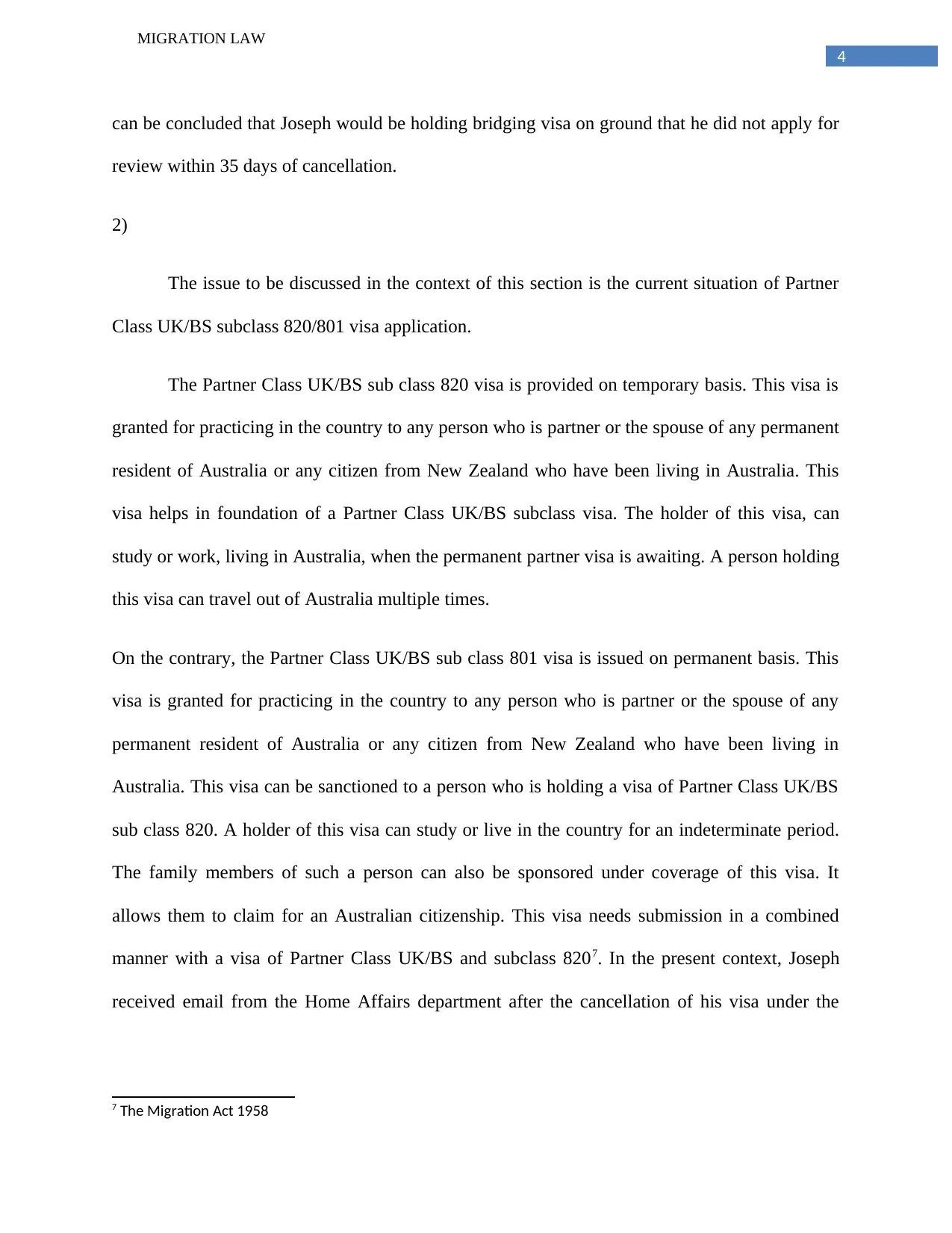
4
MIGRATION LAW
can be concluded that Joseph would be holding bridging visa on ground that he did not apply for
review within 35 days of cancellation.
2)
The issue to be discussed in the context of this section is the current situation of Partner
Class UK/BS subclass 820/801 visa application.
The Partner Class UK/BS sub class 820 visa is provided on temporary basis. This visa is
granted for practicing in the country to any person who is partner or the spouse of any permanent
resident of Australia or any citizen from New Zealand who have been living in Australia. This
visa helps in foundation of a Partner Class UK/BS subclass visa. The holder of this visa, can
study or work, living in Australia, when the permanent partner visa is awaiting. A person holding
this visa can travel out of Australia multiple times.
On the contrary, the Partner Class UK/BS sub class 801 visa is issued on permanent basis. This
visa is granted for practicing in the country to any person who is partner or the spouse of any
permanent resident of Australia or any citizen from New Zealand who have been living in
Australia. This visa can be sanctioned to a person who is holding a visa of Partner Class UK/BS
sub class 820. A holder of this visa can study or live in the country for an indeterminate period.
The family members of such a person can also be sponsored under coverage of this visa. It
allows them to claim for an Australian citizenship. This visa needs submission in a combined
manner with a visa of Partner Class UK/BS and subclass 8207. In the present context, Joseph
received email from the Home Affairs department after the cancellation of his visa under the
7 The Migration Act 1958
MIGRATION LAW
can be concluded that Joseph would be holding bridging visa on ground that he did not apply for
review within 35 days of cancellation.
2)
The issue to be discussed in the context of this section is the current situation of Partner
Class UK/BS subclass 820/801 visa application.
The Partner Class UK/BS sub class 820 visa is provided on temporary basis. This visa is
granted for practicing in the country to any person who is partner or the spouse of any permanent
resident of Australia or any citizen from New Zealand who have been living in Australia. This
visa helps in foundation of a Partner Class UK/BS subclass visa. The holder of this visa, can
study or work, living in Australia, when the permanent partner visa is awaiting. A person holding
this visa can travel out of Australia multiple times.
On the contrary, the Partner Class UK/BS sub class 801 visa is issued on permanent basis. This
visa is granted for practicing in the country to any person who is partner or the spouse of any
permanent resident of Australia or any citizen from New Zealand who have been living in
Australia. This visa can be sanctioned to a person who is holding a visa of Partner Class UK/BS
sub class 820. A holder of this visa can study or live in the country for an indeterminate period.
The family members of such a person can also be sponsored under coverage of this visa. It
allows them to claim for an Australian citizenship. This visa needs submission in a combined
manner with a visa of Partner Class UK/BS and subclass 8207. In the present context, Joseph
received email from the Home Affairs department after the cancellation of his visa under the
7 The Migration Act 1958
Paraphrase This Document
Need a fresh take? Get an instant paraphrase of this document with our AI Paraphraser
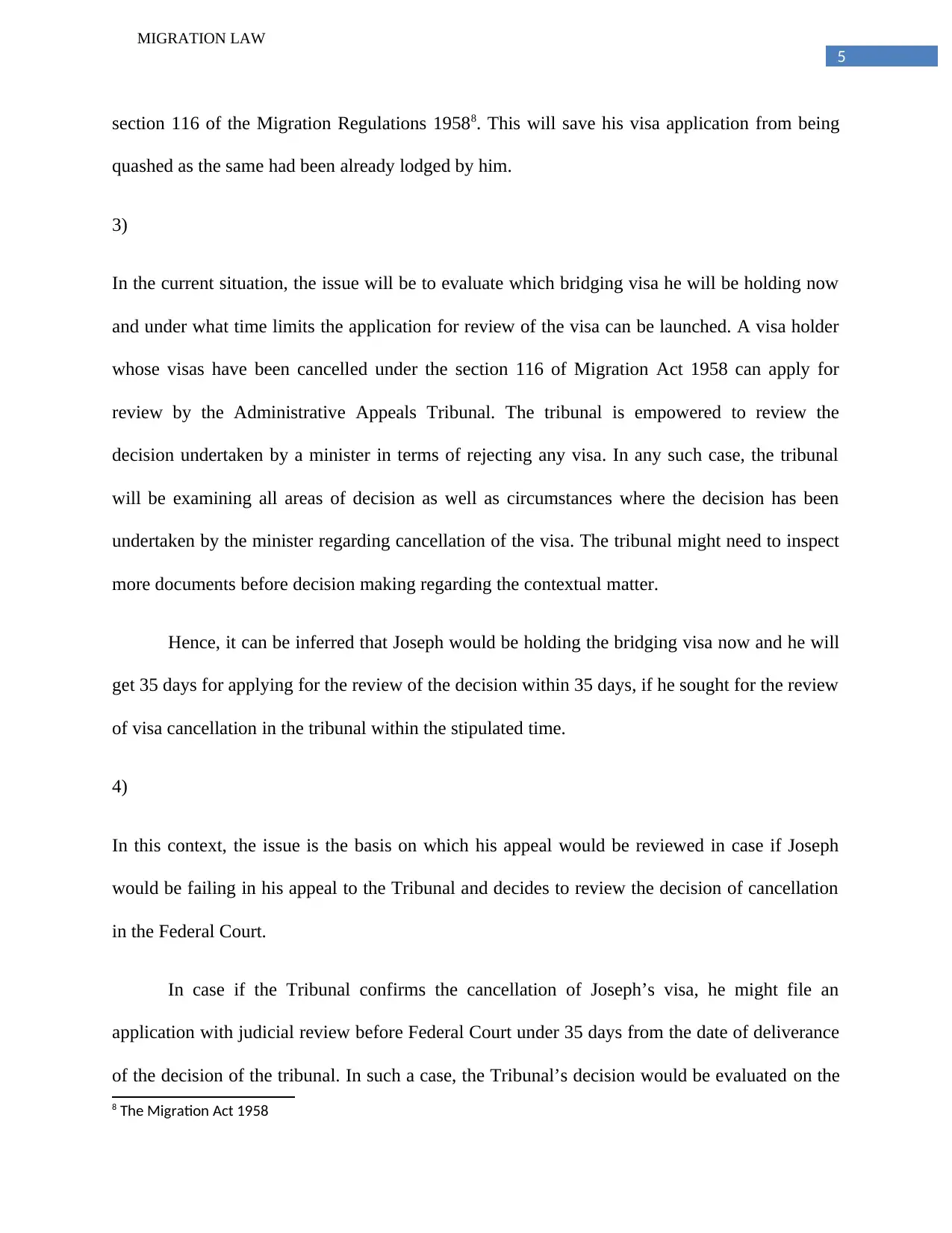
5
MIGRATION LAW
section 116 of the Migration Regulations 19588. This will save his visa application from being
quashed as the same had been already lodged by him.
3)
In the current situation, the issue will be to evaluate which bridging visa he will be holding now
and under what time limits the application for review of the visa can be launched. A visa holder
whose visas have been cancelled under the section 116 of Migration Act 1958 can apply for
review by the Administrative Appeals Tribunal. The tribunal is empowered to review the
decision undertaken by a minister in terms of rejecting any visa. In any such case, the tribunal
will be examining all areas of decision as well as circumstances where the decision has been
undertaken by the minister regarding cancellation of the visa. The tribunal might need to inspect
more documents before decision making regarding the contextual matter.
Hence, it can be inferred that Joseph would be holding the bridging visa now and he will
get 35 days for applying for the review of the decision within 35 days, if he sought for the review
of visa cancellation in the tribunal within the stipulated time.
4)
In this context, the issue is the basis on which his appeal would be reviewed in case if Joseph
would be failing in his appeal to the Tribunal and decides to review the decision of cancellation
in the Federal Court.
In case if the Tribunal confirms the cancellation of Joseph’s visa, he might file an
application with judicial review before Federal Court under 35 days from the date of deliverance
of the decision of the tribunal. In such a case, the Tribunal’s decision would be evaluated on the
8 The Migration Act 1958
MIGRATION LAW
section 116 of the Migration Regulations 19588. This will save his visa application from being
quashed as the same had been already lodged by him.
3)
In the current situation, the issue will be to evaluate which bridging visa he will be holding now
and under what time limits the application for review of the visa can be launched. A visa holder
whose visas have been cancelled under the section 116 of Migration Act 1958 can apply for
review by the Administrative Appeals Tribunal. The tribunal is empowered to review the
decision undertaken by a minister in terms of rejecting any visa. In any such case, the tribunal
will be examining all areas of decision as well as circumstances where the decision has been
undertaken by the minister regarding cancellation of the visa. The tribunal might need to inspect
more documents before decision making regarding the contextual matter.
Hence, it can be inferred that Joseph would be holding the bridging visa now and he will
get 35 days for applying for the review of the decision within 35 days, if he sought for the review
of visa cancellation in the tribunal within the stipulated time.
4)
In this context, the issue is the basis on which his appeal would be reviewed in case if Joseph
would be failing in his appeal to the Tribunal and decides to review the decision of cancellation
in the Federal Court.
In case if the Tribunal confirms the cancellation of Joseph’s visa, he might file an
application with judicial review before Federal Court under 35 days from the date of deliverance
of the decision of the tribunal. In such a case, the Tribunal’s decision would be evaluated on the
8 The Migration Act 1958
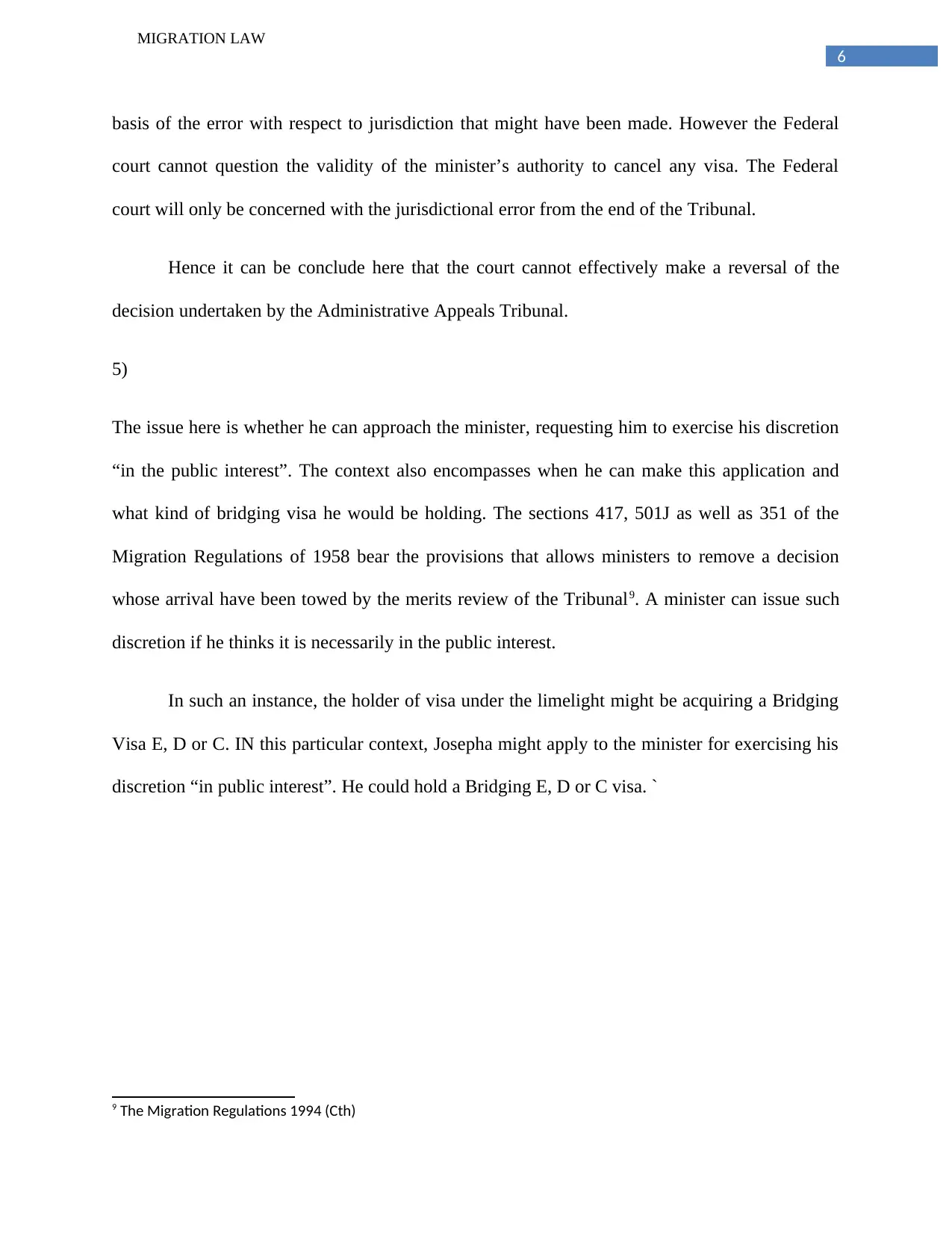
6
MIGRATION LAW
basis of the error with respect to jurisdiction that might have been made. However the Federal
court cannot question the validity of the minister’s authority to cancel any visa. The Federal
court will only be concerned with the jurisdictional error from the end of the Tribunal.
Hence it can be conclude here that the court cannot effectively make a reversal of the
decision undertaken by the Administrative Appeals Tribunal.
5)
The issue here is whether he can approach the minister, requesting him to exercise his discretion
“in the public interest”. The context also encompasses when he can make this application and
what kind of bridging visa he would be holding. The sections 417, 501J as well as 351 of the
Migration Regulations of 1958 bear the provisions that allows ministers to remove a decision
whose arrival have been towed by the merits review of the Tribunal9. A minister can issue such
discretion if he thinks it is necessarily in the public interest.
In such an instance, the holder of visa under the limelight might be acquiring a Bridging
Visa E, D or C. IN this particular context, Josepha might apply to the minister for exercising his
discretion “in public interest”. He could hold a Bridging E, D or C visa. `
9 The Migration Regulations 1994 (Cth)
MIGRATION LAW
basis of the error with respect to jurisdiction that might have been made. However the Federal
court cannot question the validity of the minister’s authority to cancel any visa. The Federal
court will only be concerned with the jurisdictional error from the end of the Tribunal.
Hence it can be conclude here that the court cannot effectively make a reversal of the
decision undertaken by the Administrative Appeals Tribunal.
5)
The issue here is whether he can approach the minister, requesting him to exercise his discretion
“in the public interest”. The context also encompasses when he can make this application and
what kind of bridging visa he would be holding. The sections 417, 501J as well as 351 of the
Migration Regulations of 1958 bear the provisions that allows ministers to remove a decision
whose arrival have been towed by the merits review of the Tribunal9. A minister can issue such
discretion if he thinks it is necessarily in the public interest.
In such an instance, the holder of visa under the limelight might be acquiring a Bridging
Visa E, D or C. IN this particular context, Josepha might apply to the minister for exercising his
discretion “in public interest”. He could hold a Bridging E, D or C visa. `
9 The Migration Regulations 1994 (Cth)
⊘ This is a preview!⊘
Do you want full access?
Subscribe today to unlock all pages.

Trusted by 1+ million students worldwide
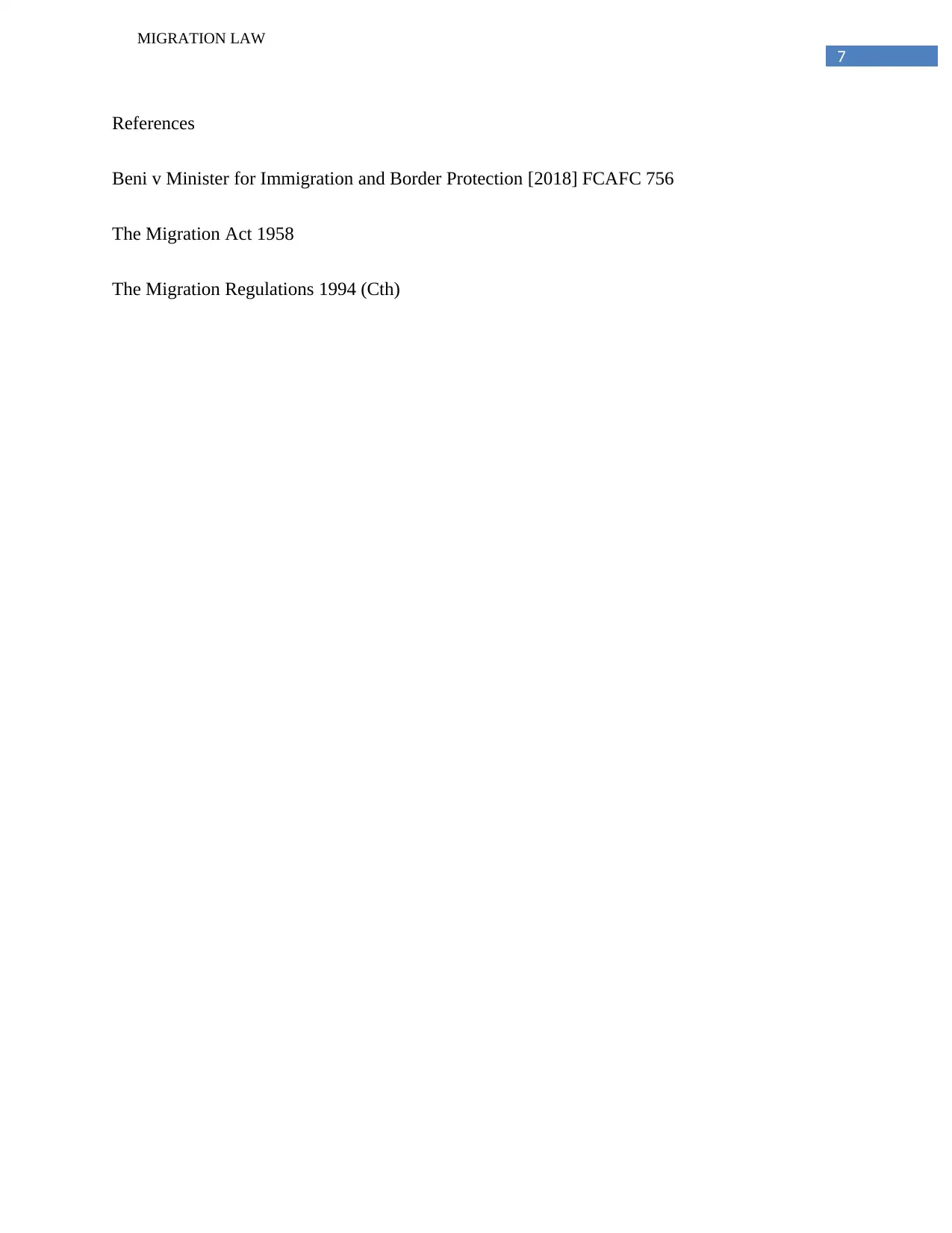
7
MIGRATION LAW
References
Beni v Minister for Immigration and Border Protection [2018] FCAFC 756
The Migration Act 1958
The Migration Regulations 1994 (Cth)
MIGRATION LAW
References
Beni v Minister for Immigration and Border Protection [2018] FCAFC 756
The Migration Act 1958
The Migration Regulations 1994 (Cth)
1 out of 7
Related Documents
Your All-in-One AI-Powered Toolkit for Academic Success.
+13062052269
info@desklib.com
Available 24*7 on WhatsApp / Email
![[object Object]](/_next/static/media/star-bottom.7253800d.svg)
Unlock your academic potential
Copyright © 2020–2026 A2Z Services. All Rights Reserved. Developed and managed by ZUCOL.





